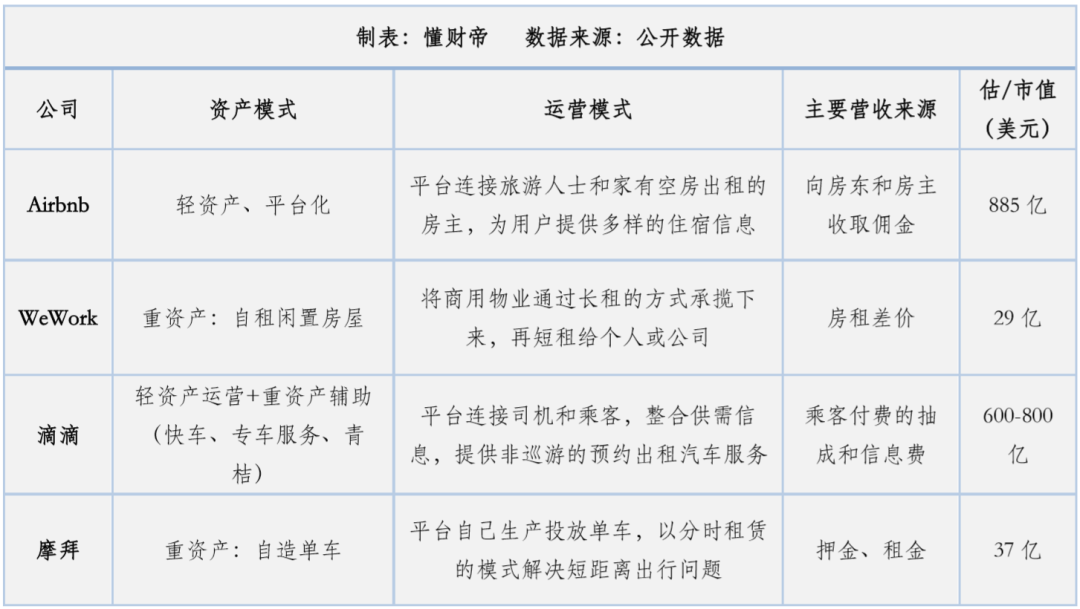There is not much time left for the Chinese unicorns.
Editor’s note: This article is from the public micro-channel number “to understand the fiscal Emperor” (ID: znfinance), Author: Tang Chao Komatsu.
Mobike, once highly sought after by investors and with a total financing of more than US$1.2 billion, has quietly disappeared.
Four years ago, the ruthless Meituan Wang Xing spent 15.56 billion yuan to acquire Mobike, of which the trademark value reached 1.6 billion yuan.
Four years later, the popular Mobike APP and Mini Programs were silently reduced to ashes. Mobike services have been fully integrated into the Meituan platform.
On one side is the elegy of the decline of shared bicycles, and on the other is the capital carnival of shared accommodation.
Airbnb went public in the bleak winter of the sharing economy, and its share price doubled on the first day. Subsequently, the market value once exceeded 100 billion US dollars, becoming the largest IPO of US stocks in 2020.
Now domestic companies such as Harbin Travel, Youke Workshop, and Didi are standing in front of the IPO.
Sharing economy, players on this track reflect the ebb and flow of capital from budding to fiery, from fiery to madness, and then from madness to exit in the tide of the times.
The rise and fall of the sharing economy in ten years
Brian Chesky, the founder of Airbnb 12 years ago, might not have thought that the business of renting out three inflatable mattresses he came up with to solve the rent would create a market valued at $88.5 billion. the company.
He didn’t even think that he set off a wave of sharing economy on both sides of the Pacific Ocean, and many entrepreneurs got involved like loach.
Finding the motivation for the birth of the sharing economy, the essence of which is to use social idle resources to achieve free combination and maximize efficiency.
However, in the PC era, due to backward technology and unsmooth communication of information, it is often difficult for the supplier and demander of idle resources to achieve effective docking.
Until 2008, with the spread of the financial crisis and the popularization of smartphones and mobile services, the domestic demand for the use of idle resources in the United States rose sharply.
At this time, entrepreneurs who sensed the opportunity also began to think about whether they could build a platform to match the transactions between supply and demand.
Following this line of thinking, companies such as Airbnb, Uber, and WeWork came into being, and quickly embarked on the fast lane of rapid growth.
Soon, the upsurge of the sharing economy drifted to Japan. This makes Sun Zhengyi, chairman of the SoftBank Group, who has successfully invested in Alibaba and made more than a thousand times the profit, extremely excited. In his opinion, the future of the sharing economy will be full of unlimited imagination.
He began to regard the sharing economy as an important part of his investment sector.
Public data shows that before listing, SoftBank’s Vision Fund invested a total of US$8.7 billion in Uber. In addition, softBank’s investment in WeWork has exceeded 10 billion US dollars.
There is no doubt that Sun Zhengyi is extremely eager to recreate the successful experience of investing in Ali. He even told Neumann, who was at the helm of WeWork at the time, “In combat, madness is better than smart, but WeWork is still not crazy enough.”
Turn your attention back to China. The mobile Internet wave is surging and surging, and Chinese entrepreneurs also hope to replicate the myth of the sharing economy across the ocean.
In 2012, Cheng Wei submitted his resignation and came to Zhongguancun, Beijing with 800,000 start-up funds to establish Xiaoju Technology (the predecessor of Didi).
But at that time, shared travel was still an extremely unfamiliar term for Chinese people. Therefore, Cheng Wei decided to start from the field of online car-hailing.
The story that followed is well known. A heavy snowfall saved Cheng Wei and Didi.
At the end of 2015, after Didi merged with Uber China, it has occupied 76.8% of the ride-hailing market share and more than 90% of the online car-hailing market, with a valuation of US$70 to 80 billion.
The success of Cheng Wei and Didi directly detonated the enthusiasm of entrepreneurs, and capital poured into the sharing economy track.
For a time, colorful shared bicycles can be seen everywhere, and items such as shared power banks, shared umbrellas, shared basketballs, and shared fitness warehouses emerge in endlessly.
However, blessings come and misfortunes come, and misfortunes come and blessings come. The sharing economy industry quickly fell into a trough.
In 2017, Uber broke out many scandals, executives left, and the organizational structure began to lose control.
In 2018, Didi broke out a safety accident and encountered a crisis of public opinion. The Shunfeng car business was removed indefinitely for rectification. In the same year, Mobike sold itself to Meituan, Hu Weiwei resigned as CEO, and OFO also faced a crisis of breaking the capital chain.
Public data shows that in 2019, China’s direct financing of the sharing economy track was only 71.4 billion US dollars. Two years ago, this figure was as high as 194.1 billion US dollars.
The pessimistic market sentiment is transmitted to the capital market. Uber fell below the issue price on the day it went public, and its market value compared to its previous valuation of $120 billion, evaporating more than half.
In addition, WeWork, which intends to sprint for an IPO, has also plunged its company valuation from US$47 billion to US$15 billion due to its deep loss.
Obviously, as the tide fades, the naked swimmer has already appeared.
Share authenticity and hidden worries
Interestingly, not all sharing economy companies are plagued by the cold winter.
According to media reports, as early as 2019, the “three powers and one beast” in the shared power bank track basically achieved profitability, or at least achieved a breakeven.
The reason behind digging deeper is mainly the rising price of power bank rentals.
In this regard, many people in the industry said that sharing power banks, shared bicycles, and even shared office is not a real sharing economy, they are more like a commercial leasing behavior.
Platform parties such as OFO and Mobike provide users with travel services on time-sharing leases of fixed assets such as bicycles and electric vehicles, while shared office represented by WeWork has directly started a “second landlord” business.
Li Kaifu once said: “The world’s largest taxi provider (Uber) has no cars, the largest retailer (Alibaba) has no inventory, and the largest accommodation provider (Airbnb) has no real estate.”
Undoubtedly, from the perspective of the nature of the sharing economy, companies such as shared power banks, shared bicycles, and shared offices are all extremely asset-heavy operating models and a pseudo-sharing economy.
Now that the market has settled down, most of the pseudo-sharing economy companies have been eliminated. But it is worth noting that the true sharing economy companies have not ushered in the spring.
The market is still harsh on them.
Sharing economy platform, one side connects B-side resources, the other side connects C-side users, traffic is its core lifeblood.
But currently, for players on the track, the biggest problem they face is the exhaustion of traffic and the slow growth of users and orders.
According to public data, although Didi Monthly (MAU) has exceeded 400 million, its global daily orders are only 60 million orders, which is far from the goal of serving 100 million orders per day in its “0188” strategy. Far away.
In addition, due to the continued downturn in the market, Didi’s previous main segment of the ride-hailing business is still difficult to recover, and the position of its entrance in the Didi APP has also been adjusted.
The new crown epidemic has a greater impact. During the epidemic, Didi’s online car-hailing orders fell to 10 million single orders. Didi Express interviewed several Didi Express drivers in Shanghai at random. They all stated that they could hardly receive travel orders during the epidemic, and the current daily average order quantity is much lower than before the epidemic.
The leading shared accommodationAirbnb was also severely hit by the epidemic. According to data released by the short-term rental market analysis website AirDNA, from January to March this year, the booking rate in Beijing on the Airbnb platform dropped as much as 96%.
Affected by this, Airbnb subsequently lowered the company’s valuation to $26 billion. When it was raised in April last year, its valuation by investors dropped to US$18 billion.
In addition to the traffic crisis, the sharing economy platform also implies great security policy risks.
Data shows that in 2019 alone, there were as many as 230 cases of installation of hidden cameras in rooms on the Airbnb platform, bed bug infestation, and smoking and burning of houses by tenants. At the same time, Uber has also experienced various robberies and sexual assault cases one after another.
Dida Travel, whose main business is the Shunfeng car business, also wrote in its IPO prospectus that “If safety issues occur again, we will have to incur significant operating and compliance costs, and even adjust or suspend our business activities.”
Brian Chesky, the founder of Airbnb, once stated at the “New York Times” transaction record conference: “In the final analysis, we are doing a trust business.”
But now it seems that with frequent security incidents, the trust between users and the platform does not seem to be strong.
IPO profit curse
All business activities that are not for profit are hooligans.
The battle for the sharing economy track has entered the second half, and profitability and listing are becoming players’ top priorities.
Finding the motivation, this aspect is the requirement of investment institutions. Li Chengdong, a former Tencent and JD strategy analyst, mentioned in an interview with Tencent Technology that some of Didi’s early investment shareholders and subsequent shareholders are eager to sell Didi’s shares.
On the other hand, it is mainly to expand the amount of financing and continue to fight in an enclosure.
Therefore, in October last year, Tide Travel was the first to sound the Hong Kong Stock Exchange assembly call. Subsequently, Didi was not to be outdone.
According to LatePost reports, “Didi plans to go public in Hong Kong in 2021, with a target valuation of US$60-80 billion.” But unlike Didi, Didi is currently only profitable in its core business, while Didi Travel It has achieved large-scale profitability.
This is reminiscent of Uber a year ago.
Public data shows that Uber’s issuance price is $45, but due to huge losses, it plummeted 7.62% on the day of listing. Although its stock price has risen to 53.28 US dollars and its market value is 93.974 billion US dollars, the long-term share price downturn still makes investors feel lingering.
We don’t know whether Didi will follow Uber’s footsteps after listing. But what is certain is that the company’s profitability will inevitably boost the sentiment of the capital market.
Airbnb knows this.
As early as 2017, Airbnb achieved annual profits, with revenue of US$2.6 billion and net profit of US$93 million. In 2018, Airbnb revenue continued to climb to $3.8 billion.
Although Airbnb suffered huge losses due to the Black Swan incident in the first half of 2020. But in the third quarter, Airbnb achieved profitability again by reducing operating costs, with a net profit of $219 million.
As a result, Airbnb was highly sought after by investors on the day of its listing. Its opening price was $146, which was more than twice the premium of the IPO price. At present, the market value of Airbnb is still as high as 88.5 billion US dollars.
In contrast, the ups and downs of Airbnb and Uber’s listed stock prices undoubtedly sounded the alarm for domestic sharing economy unicorns.
The mobile Internet wave is gradually receding. Profit may become a necessary condition for the continued survival of the sharing economy players.
At present, there is not much time left for the unicorns.


